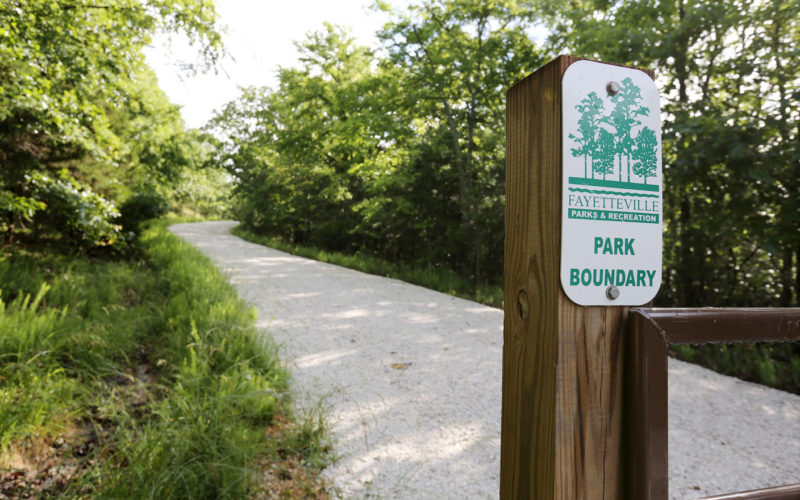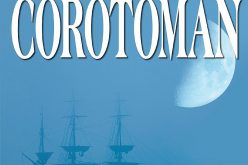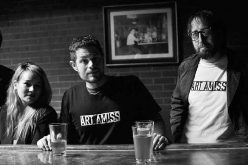Biking park development on fast track
STACY RYBURN
sryburn@nwadg.com
The developers behind a planned mountain-biking attraction set to host a 2022 world championship say they aren’t worried about building the trails and other features in time.
The Fayetteville City Council last weekunanimously approved a conceptual plan for Centennial Park at Millsap Mountain. The plan entails nearly 17 miles of mostly soft-surface trail weaving through the mountain, along with children’s play areas, places to picnic, a canopy walk, stage and a spot for hammocks.
Once finished, the park will serve as host to the UCI Cyclocross World Championships, Jan. 29-30, 2022. UCI stands for Union Cycliste Internationale and is known in the United States as the International Cycling Union. It will be the second time the event has been held in the United States. Louisville, Ky., hosted the event in 2013.
Cyclocross is akin to mountain biking, involving short courses with obstacles, hills, steps and rough terrain prompting riders to get off their bikes to run for certain parts and get back on. Its first races began in the early 20th century in Europe. The sport came to the United States in the 1960s and 1970s and has grown in popularity since the 1990s, national bicycle advocates say. It still has a large following in Europe.
The city, NWA Trail Blazers, CEI Engineering and the Runway Group are working to create the mountain-biking and cyclocross facility on the 228-acre wooded site west of Interstate 49 and north of Martin Luther King Jr. Boulevard.
Most cyclocross courses are built a few weeks before a race and get taken down afterward, said Brendan Quirk with the Runway Group, which is a Walton family company taking on programming at the site. The city will join few others in the country with a year-round site for training and events, he said.
“Every year what you’ll have is the best cyclists in the world coming through Fayetteville to race up at Millsap Mountain,” Quirk said.
The team has to get to work fast with the world championship looming.
An art
The next step is to get all the contracts in order, said Erin Rushing, NWA Trail Blazers executive director.
The city and the Trail Blazers are splitting the workload. The city will pay for and oversee some of the more basic elements, such as an 80-space parking lot, restrooms, an access road from Old Farmington Road and signs, outdoor furniture and sidewalks.
The budget on the city’s side is $985,000. That money will come from the bond issue for parks voters approved in April, said Ted Jack, park planning superintendent. Contractors will need to be hired to do the work.
The Trail Blazers will handle development of the trails. CEI, which drew up the plan, will help on the engineering side, Rushing said. A separate contractor will build the trails, he said.
The trails will range in difficulty, from a leisurely riding experience to professional grade, the plan shows. About a mile of paved trail will connect to the Razorback Greenway, forming a link between Kessler Mountain and campus.
The plan is to apply for a grant from the Walton Family Foundation to pay for building the trails, Rushing said. The foundation has spearheaded the project from the beginning, providing a 50-50 matching grant with the city to buy the land from Centennial Bank last year.
The foundation covered half the cost of the $3.3 million purchase, giving the city an interest-free loan to cover the rest. The city has five years to pay the loan.
Rushing said the trails team is working out the cost of building the trails now that the plan has been approved. Much of the final design will depend on the terrain, topography and what’s out there, he said.
Building trails isn’t as straightforward as building a road, Rushing said.
“It’s an art, what these guys do,” he said. “The angles, the slopes, the drainage, the reverse grades, it’s all an art.”
Coexisting
Rushing said he has no apprehension about getting the trails finished in time for the world championships. Construction could begin this fall, he said.
The world championship event has a projected $2.3 million economic impact on the region, according to figures Quirk provided. Other large-scale events, such as the USA Cycling National Cyclocross Championships and UCI’s mountain biking World Cup, could have economic impacts of $1.3 million to $2.5 million each, according to Runway’s projections.
The numbers are based on studies following major USA Cycling and UCI events, said Devin Howland, the city’s economic vitality director.
Those other major events haven’t been booked yet, but they serve as an example of the potential impact once Centennial Park is finished, Quirk said.
The park also will serve as host to smaller events, and some have already started. BikeNWA held the cyclocross Oz Cross event in November and will do it again Oct. 5-6 at the mountain.
Paxton Roberts, BikeNWA executive director, said Oz Cross doesn’t need the trails because the event uses the open space at the top of the mountain with makeshift courses. Organizers tear down what they put up after the event, and the grass grows back over course spots, he said.
Organizers with the world championships anticipate 8,000 to 10,000 people to attend.
There won’t be a conflict if trail construction for the park happens at the same time as the Oz Cross event, Roberts said. The trails mostly wind deeper down the mountain, while Oz Cross will happen at the clearing at the top, he said.
“We’ll coexist very easily,” Roberts said.
A full workout
The city’s partnership with the Walton Family Foundation to build the park joins a growing trend in the nation of private-public investment in cycling facilities, said Ken McLeod, policy director for the League of American Bicyclists. The Waltons’ investment in the region has had a visible influence on other parts of the country, with bicycle advocacy groups, municipalities and investors putting their heads together to build new attractions, he said.
Cyclocross also is growing in the United States, McLeod said. The sport is basically the CrossFit of mountain biking, and its draw is far and wide, he said.
Those who aren’t inclined to take part can enjoy being spectators, he said. The short courses bode well for viewing, plus the crowds tend to get rowdy.
“I think people are drawn to it because it’s a fun and fast sport,” McLeod said. “There’s always something different in the course. There’s a lot of turning; there are the obstacles you’re dealing with. It’s a really engaging way to ride. It’s a full workout.”
Mike Levitsky, a regional cyclocross race promoter, said cyclocross probably serves as the most accessible form of cycling. Riders can use almost any type of bike with a decent tire tread and don’t have to rely on becoming part of a group to participate, such as with long-distance racing, he said.
Levitsky teaches a weekly clinic on the sport. Enrollment is pretty evenly spread between men and women, adults and children, he said. Women are probably the fastest growing demographic of cyclocross riders in the region, Levitsky said.
Having the year-round courses at Centennial Park will only make the sport grow, he said.
“If anybody has an inkling, they should definitely just come out,” Levitsky said. “It’s an amazing community, and it is really approachable and really easy to start. If I could put that on a billboard I would.”
__
Web watch
For more information on Centennial Park and to see the conceptual plans, go to:
fayetteville-ar.gov/centennialpark






